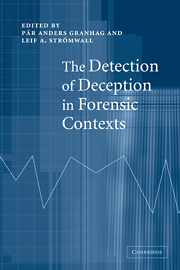Book contents
- Frontmatter
- Contents
- List of figures
- List of tables
- List of contributors
- Part 1 Introduction
- Part 2 Lie-detection techniques
- Part 3 Special issues facing a lie-catcher
- 6 Lies travel: mendacity in a mobile world
- 7 Coping with suggestion and deception in children's accounts
- 8 True or false: ‘I'd know a false confession if I saw one’
- 9 Crime-related amnesia as a form of deception
- Part 4 Enhancing lie-detection accuracy
- Part 5 Conclusions
- Index
- References
7 - Coping with suggestion and deception in children's accounts
Published online by Cambridge University Press: 22 September 2009
- Frontmatter
- Contents
- List of figures
- List of tables
- List of contributors
- Part 1 Introduction
- Part 2 Lie-detection techniques
- Part 3 Special issues facing a lie-catcher
- 6 Lies travel: mendacity in a mobile world
- 7 Coping with suggestion and deception in children's accounts
- 8 True or false: ‘I'd know a false confession if I saw one’
- 9 Crime-related amnesia as a form of deception
- Part 4 Enhancing lie-detection accuracy
- Part 5 Conclusions
- Index
- References
Summary
Children are increasingly called upon to give evidence in civil and criminal matters in the courts. On many occasions they will appear as victims, typically involving allegations of sexual or physical assault, but also as witnesses, to domestic violence, street incidents or road accidents (Westcott, Davies, and Bull, 2002). In most countries, the law recognises the special status of children as vulnerable witnesses, who require investigative procedures and methods of hearing their evidence that take account of their perceived needs. The United Kingdom has been at the forefront in legislating legal and procedural changes designed to assist children in first eliciting and then giving their evidence in court, the latter a necessary requirement in an adversarial system of justice (Spencer and Flin, 1993).
In England and Wales, the use of closed-circuit television in court and the use of pre-recorded interviews have allowed many children for the first time to have their evidence heard in court and to exercise their rights as citizens to protection under the law (Cashmore, 2002). However, paralleling such procedural innovations has been a growth in predictable concerns over the reliability of children's evidence. Among the issues raised has been the possibility that children may lie or deliberately mislead in the witness box, parental pressures and coaching and vulnerability to suggestive questions during investigative interviews (Besharov, 1985; Coleman, 1990; Pendergrast, 1996; Wakefield and Underwager, 1988).
- Type
- Chapter
- Information
- The Detection of Deception in Forensic Contexts , pp. 148 - 171Publisher: Cambridge University PressPrint publication year: 2004
References
- 4
- Cited by



